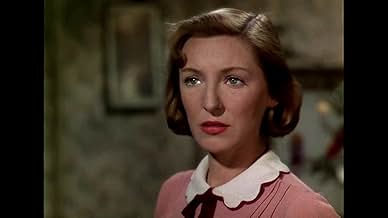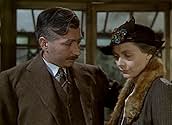AVALIAÇÃO DA IMDb
7,3/10
4,4 mil
SUA AVALIAÇÃO
Adicionar um enredo no seu idiomaA chronicle of the lives of the Gibbons family, from shortly after the end of World War I to the beginning of World War II.A chronicle of the lives of the Gibbons family, from shortly after the end of World War I to the beginning of World War II.A chronicle of the lives of the Gibbons family, from shortly after the end of World War I to the beginning of World War II.
- Direção
- Roteiristas
- Artistas
- Prêmios
- 1 vitória no total
Robin Burns
- Man in Crowd
- (não creditado)
Mabel Etherington
- Lady in Crowd
- (não creditado)
Dan Lester
- Man in Crowd
- (não creditado)
Jim Morris
- Man Operating Small Boats at Fairground
- (não creditado)
Avaliações em destaque
Old-fashioned? Arch dialogue? Stiff acting? Viewable only as an historical document? Guilty on all counts, but this film still captivates. Made during the second World War, it was probably intended as a flag-waver, a morale booster for the worn-down citizens of Britain, but in fact is much more than that. The story (Noel Coward) deals with the lives and times of an ordinary family in 'between the wars' London. There is nothing dramatic, just the everyday events and the weddings, births and funerals that visit us all. However, there are some wonderfully quiet scenes - the father-to-son talk before the son's wedding is especially notable for its old-fashioned moral uprightness, the way the camera lingers in an empty room when the family learns of a terrible road accident, and Frank's gentle chat with his neighbour over a few glasses of whisky as they prepare to go their separate ways. Director David Lean handles these with care and reserve. The way the family deals with the mini-dramas that beset them was no doubt meant to say to the war-weary people that we may be a middling, grey little society with predictable ways, but it was worth fighting for. The film always leaves me a little melancholy, missing an age that still existed in many ways when I was a youngster. No doubt to a modern cinema audience that can't manage without an explosion or car-chase every ten minutes this would be regarded as dull and boring, but I love its charm.
The movie narrates the happenings of a British family since the first world war (1914-18) until the end second world war (1939-45) . The parents (Robert Newton and Celia Johnson) , the troubled and rebel daughter (Kay Walsh) , the friendly neighbor (Stanley Holloway) , the seaman son (John Mills) and others . Meanwhile , being reflected the course of time and are succeeding various historic deeds , thus : the first and second world wars , the soldiers recruitment , death of the king George , the jolly reception to Minister Chamberlain after the useless Munich Convention with Hitler , the trenches digging in preventing the bombing over London by the Germans .
The movie is interpreted by the greatest English actors with important careers . Robert Newton (Treasure island) , Celia Johnson (Brief encounter) , John Mills (Daughter of Ryan), Kay Walsh (Oliver Twist), Stanley Holloway (My fair lady) . Colorful and glittering cinematography by Ronald Neame , a future director with many successes (Adventure of the Poseidon) . Musical conducting by Muir Mathieson , habitual of English classic films , as he was director of symphonic orchestra of London . The picture begins and finishes with a camera travelling from exterior and interior home what it subsequently would be copied in a lot of films (for example : The Family by the director Ettore Scola) . The motion picture was perfectly directed by David Lean considered the greatest British filmmaker . Rating : Awesome . Above average.
The movie is interpreted by the greatest English actors with important careers . Robert Newton (Treasure island) , Celia Johnson (Brief encounter) , John Mills (Daughter of Ryan), Kay Walsh (Oliver Twist), Stanley Holloway (My fair lady) . Colorful and glittering cinematography by Ronald Neame , a future director with many successes (Adventure of the Poseidon) . Musical conducting by Muir Mathieson , habitual of English classic films , as he was director of symphonic orchestra of London . The picture begins and finishes with a camera travelling from exterior and interior home what it subsequently would be copied in a lot of films (for example : The Family by the director Ettore Scola) . The motion picture was perfectly directed by David Lean considered the greatest British filmmaker . Rating : Awesome . Above average.
Whether or not, one agrees with the "truth or morality" of Noel Coward's ennobling view of the British "bourgeois" from 1919-1939, the acting and direction in "This Happy Breed", are superb, and what a cast. I think the notion of sacrifice, pride, and work ethic, might have easily been written about many similar low and middle income families in America from Brooklyn to San Francisco, during the same period, as it was portrayed in the equally, excellent film, "Best Years of our Lives" (1946)
I throughly enjoyed this little gem of a film. It is very well acted and it was nice to see a smart well groomed Robert Newton being a million miles away from Long John Silver. It had some laughs,some drama and quite a bit of sadness and as you get to know the different characters you feel a genuine fondness for them. I was brought up in the 1950's and recall visiting relatives who had grandmas and spinster aunts living with them, just like in this film. Though there is bickering and some harsh words used by the family, it does represent a time when families stuck together and deep down loved and respected one another. If you get the chance to see this movie, then I am sure that you will enjoy it.
This British Technicolor domestic drama from Eagle-Lion and director David Lean charts 20 years in the life of the Gibbons family, from 1919 to 1939. Husband Frank (Robert Newton) has just returned from fighting in WW1, and he and his wife Ethel (Celia Johnson) are moving into a new home in a crowded working class neighborhood. We follow them as they have children, raise them, and deal with the various ups and downs of family life, all leading up to the outbreak of WW2. Also featuring John Mills, Kay Walsh, Stanley Holloway, Eileen Erskine, John Blythe, Amy Veness, Alison Leggatt, and the voice of Laurence Olivier.
Based on a play by Noel Coward, this bears some thematic similarities to 1933's Cavalcade. This is more accessible though, and certainly much better made. Technically the movie is a marvel, with perhaps the best looking color cinematography, courtesy of Ronald Neame, up to this point in film. Lean's direction is also very admirable, with interesting and innovative camera movement. There's one truly outstanding scene wherein a person who has bad news to share exits out of the back door into a garden to relay the message, only the camera stays inside the house, moving a bit, looking out into the backyard but not seeing the news being delivered, all the while loud, upbeat music is blaring from a radio. It's a shattering scene that depicts the often banal setting for life-changing developments. Unfortunately I found much of the rest of the movie uninvolving. The acting is good, very natural and played in the medium to low register. I just couldn't bring myself to get emotionally connected with much of it.
Based on a play by Noel Coward, this bears some thematic similarities to 1933's Cavalcade. This is more accessible though, and certainly much better made. Technically the movie is a marvel, with perhaps the best looking color cinematography, courtesy of Ronald Neame, up to this point in film. Lean's direction is also very admirable, with interesting and innovative camera movement. There's one truly outstanding scene wherein a person who has bad news to share exits out of the back door into a garden to relay the message, only the camera stays inside the house, moving a bit, looking out into the backyard but not seeing the news being delivered, all the while loud, upbeat music is blaring from a radio. It's a shattering scene that depicts the often banal setting for life-changing developments. Unfortunately I found much of the rest of the movie uninvolving. The acting is good, very natural and played in the medium to low register. I just couldn't bring myself to get emotionally connected with much of it.
Você sabia?
- CuriosidadesThe voice of the uncredited opening narrator is that of Laurence Olivier.
- Erros de gravaçãoFrank is shown reading a copy of the 16 September 1930 edition of the Daily Mirror with the headline story about the elections in Germany held on 14 September where the Nazi Party increased their seats in the Reichstag from 12 to 107. He then goes to the back yard to help shake out the tablecloth, but the cherry tree there is still in full bloom, months after the blossoms should have disappeared.
- Citações
Frank Gibbons: She didn't pass on, pass over, or pass out! She died!
- Cenas durante ou pós-créditosOpening credits prologue: This is the story of a London family from 1919 to 1939.
- ConexõesFeatured in Jonathan Ross' Must-Watch Films: Crime Films (2023)
- Trilhas sonorasRule Britannia
(uncredited)
Lyrics by James Thomson
Music by Thomas Augustine Arne
Sung by Robert Newton (Frank) and Stanley Holloway (Bob) coming home after their reunion
Principais escolhas
Faça login para avaliar e ver a lista de recomendações personalizadas
- How long is This Happy Breed?Fornecido pela Alexa
Detalhes
- Data de lançamento
- País de origem
- Idioma
- Também conhecido como
- This Happy Breed
- Locações de filme
- Alderbrook Road, London, Greater London, Inglaterra, Reino Unido(exteriors of family house near corner with Bellamy St. - still standing in 2022)
- Empresas de produção
- Consulte mais créditos da empresa na IMDbPro
Bilheteria
- Orçamento
- £ 200.000 (estimativa)
- Faturamento bruto mundial
- US$ 158
- Tempo de duração1 hora 55 minutos
- Proporção
- 1.37 : 1
Contribua para esta página
Sugerir uma alteração ou adicionar conteúdo ausente

Principal brecha
By what name was Este Povo Alegre (1944) officially released in India in English?
Responda






























